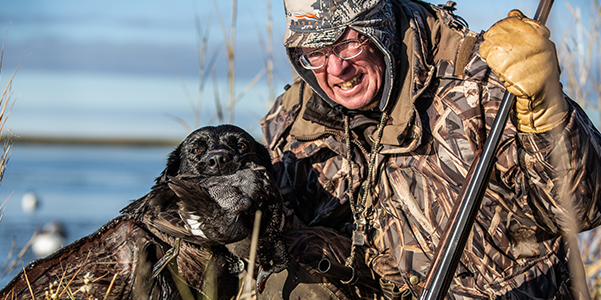John Dale

John Dale cherishes every sunrise in the marsh, and he's doing all he can to make sure the duck hunter's show shines brightly now and goes on long after he's gone.
A professed self-taught duck hunter, Dale read every outdoor book and magazine he could find as a boy and then took to the Minnesota lakes and marshes near home to figure out how to hunt waterfowl. Although the early lessons inflicted a few tough lessons, Dale quickly grew to love the waterfowl hunting lifestyle. More than 60 years after he shot his first duck, Dale's fire for ducks and duck hunting is as strong as ever-which is fortunate for all of us.
Dale is an exceptionally engaged and generous waterfowl conservation philanthropist. He has supported waterfowl research projects, habitat conservation initiatives, and duck production programs. When presented with the details of Delta Waterfowl's Million Duck Campaign, Dale has again shown exemplary conservation leadership with a multi-million-dollar donation and a significant end-of-life pledged gift.
"I think it's a really ambitious goal," Dale said of the Million Duck Campaign, a $250 million plan to add 1 million ducks to every fall flight through Delta's Duck Production programs. MDC will also bolster Delta's Habitat Conservation, Research and Education, and HunteR3 pillar programs.
"I think Delta is doing two things that are game changers in the waterfowl world," he said. "One is drone research (starting this spring in Saskatchewan), which I think is going to change the whole picture in terms of the costs of searching for nests, finding broods, and the labor-intense nature of that searching. As soon as I heard about that, I helped fund it. The second one is Hen Houses. They're ridiculously simple, yet remarkably effective. You can get a 10-fold increase in mallard production just by putting up Hen Houses. That's a huge deal, and it's why I funded the first-ever Delta-program Hen Houses in South Dakota. It's a low-tech, simple solution that the ducks have proven they like."
In January, Delta began installing the 515 Hen Houses in South Dakota that Dale funded. The tubular nest structures, which are primarily used by mallards, keep nesting hens out of reach of most mammalian predators and give the ducks much greater odds of hatching their eggs. Nest success is a key factor in maintaining and increasing duck populations.
Dale, who retired after 47 years as an investment manager in Minneapolis, joined Delta's Board of Directors in February 2020. He now lives in Waubay, South Dakota, with his wife, Cheryl.
Dr. Frank Rohwer, Delta's president and chief scientist, appreciates Dale's outstanding, year-round commitment to waterfowl conservation.
"John Dale is such a thinking waterfowl guy," Rohwer said. "He's totally devoted to conservation. For him, it's not about him shooting more ducks, it's about the world being a better place for ducks now and in the future. He knows so much about ducks, and he's cared enough to pay attention to what matters to ducks: protecting wetlands and making the habitat productive. That's what I love about him."
Dale definitely understands the dynamic challenges that ducks face on the ever-evolving prairie breeding grounds. He supports a comprehensive waterfowl conservation strategy that pairs Habitat Conservation through policy action with Duck Production programs such as Hen Houses and Predator Management.
"I've been hunting prairie Canada since the early 1960s," he said. "When I first went up there, there were no raccoons. They're an invasive species. They weren't part of that ecosystem, but now they are, and they're devastating to ducks that were part of that native ecosystem. After years of figuring out how to do trapping, Delta has figured out that you can use trapping selectively to really enhance production."
Dale aptly points out that urbanization and development continue to swallow wetland habitat.
"I also support Delta's policy initiatives," he said. "You can buy acres and lease acres, but the real bang for your buck is changing policy. Wetland conservation policy in Canada has been generally poor, and I think Delta's work on policy-the GROW program in Manitoba-is important.
"We're going to continue to lose habitat, so you have to figure out how to make the habitat you have more productive. That's where Delta's Million Duck Campaign comes in. In order to raise a million more ducks, we need habitat. You can't put a Hen House in a concrete parking lot. Habitat is key, and so is having productive habitat."
Dale said his philanthropy is fueled both by passion and urgency for waterfowl. He's challenging all conservation-minded waterfowl hunters to make a difference right now.
"A lot of people leave legacy gifts for conservation, which is fine," Dale said. "I decided a few years ago to figure out a better balancing act than just leaving it upon your death. The need right now is so crucial. None of the Duck Production programs are going to get any cheaper. The philanthropists and others need to ask themselves: What are we going to do now as opposed to later? The need is increasingly urgent. Can you step up your current giving?"
Jeffrey Howell, vice president of major gifts for Delta Waterfowl, said Dale serves as a fantastic role model for all conservation-minded waterfowl hunters.
"We're so incredibly thankful for John," Howell said. "He's a generational grand champion of waterfowl conservation whose generosity will resonate for decades. His passion for waterfowl - especially diving ducks - and hunting dogs is remarkable. Everyone who loves waterfowl is better off because of John Dale."
As long as he's able, Dale will be out in a marsh with his Lab, Skipper, enjoying the duck-filled skies his support has helped create.
"My favorite thing to do in the world is go out with my dog and enjoy the show," he said. "I don't have to shoot all of the ducks, but I sure want to see them. That's why I'm doing this: To make sure there are places for ducks." -Paul Wait



